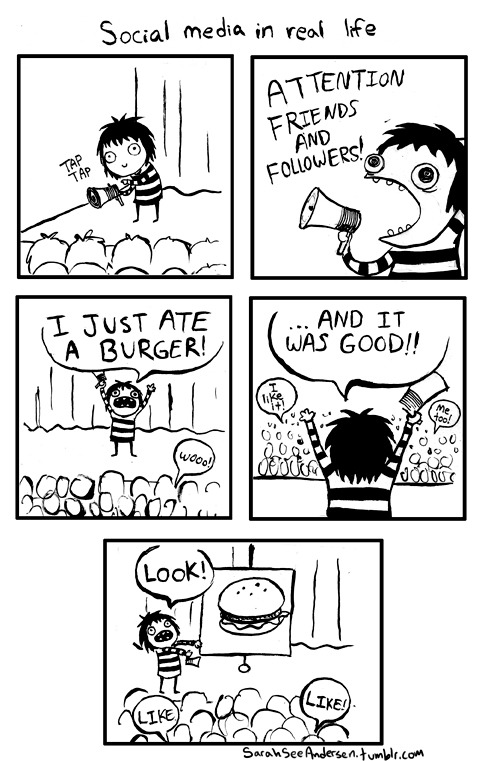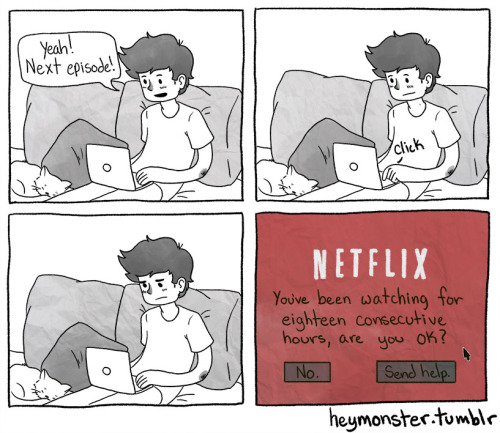Dear Citizens of the Internet,
As technology (reified in this case to mean anything that connects you to the internet or allows you to interact with digital media) becomes more a part of our everyday living, so do the conversations about how it should be used in education become more urgent.
There are the tropes that portray technology as meaningless interaction, but this kind of fluff interaction happens in real life, too. It's a part of social development. We see the same things in 'real' or analog life happening online, like attention-seeking (as depicted above) and bullying.
Kids are portrayed as 'digital natives' (comics about kids being natural technicians), but I believe it has been a phenomenon in every generation that the adults see the new generation growing up in a different environment, and a mix of unfamiliarity and nostalgia paint it negatively.
Technology may change the ways that we think and process information, but it does not destroy our capacity for imagining, creating, or thinking critically.
To me, Education, as always, is about giving students the tools to prosper as individuals. This means teaching them critical thinking, contemplation, and individuality, no matter what the tools. And the more explicit the conversation about what tools we all have at our disposal and how best to use them, the better. 'Smart' classrooms, with SmartBoards and touch screen everything, are wonderful resources for making lessons interactive and investigative, but we need to remember that these activities must be guided and connected to an overarching lesson. Technology may indicate pedagogy, but we need to remember that technology is neither the lesson nor the instruction in itself.
Depictions of the internet as utopian or dystopian depend upon this one critical difference: whether the tech is portrayed as the tool or the user. In the most extreme dystopias, technology becomes a system wherein people are monitored and limited in what they are permitted to do within their society. I want to speak to the technologies present today and in the near future (a reality short of AI and robotic overlords); technology has been vilified when really, the 'evil' portrayed is human. Humans abuse surveillance, humans mistreat each other, humans overstep personal freedoms and rights, humans give themselves over to mindless television, and humans write hurtful comments on anonymous work.
I believe that massive access to information is a wonderful thing, but that it takes maturity to learn largely independently. This MOOC has been incredibly rewarding and insightful for me, because I had already developed the ability to contemplate ideas and articulate my thoughts on them prior to this experience. I am self-motivated and can manage my time to meet goals that I have set for myself. Elementary children have these capacities, but need the scaffolding to develop them. I agree that more media should be brought into the classroom, and furthermore, that it should be assigned for homework.
I believe that we need to have direct conversations with young students about what role technology plays in their lives, and give them the autonomy to learn from digital media at their own pace. However, I strongly believe, regardless of the advancement of technology, that elementary education needs to focus more on developing independent thinkers. People too often fall into a pattern of mindless consumption of entertainment, whether it is magazines, television, or facebook; we need to empower students to be aware of their choices and to make them mindfully.
Regards,
Lauren
Lauren in the Blogosphere
Wednesday, February 27, 2013
Friday, February 15, 2013
To Blog. That is the Answer.
To Whom It May Interest:
The internet is a big, anonymous place. It is a domain infested with adorable cat pictures and viral media, and I love spending my time here. However, it generally does nothing to feed my soul. The wonderful (utopian) potential of the internet is the possibility to connect with others and to disseminate information, whether that be an expression of compassion or a dissertation. Of course, the joke is that, more often than not, this potential goes unfulfilled.
The system of education stems from a similarly idealistic vision. We can prepare individuals to be productive, fulfilled members of society by equipping them with the body of knowledge and understanding (note that these are separate concepts- I'm sure I'll get back to this assertion later) compiled by humanity. Of course, the How gets muddled as we determine just what comprises this Great Curriculum, how to present it, and how to assess it.
I went through college with the plan to become a classroom teacher in a public elementary school. I had a difficult time adjusting to the realization that not everyone in the field of Education shares my ideals, and I still struggle not to become jaded by the systems surrounding education.

Luckily, a friend sent me the link to openculture.com, which lead me to the discovery of Massive Open Online Courses (MOOCs). I've been looking for some sort of further education for myself, but, without certainty about which career path I want to pursue, I couldn't commit my time and money to a full online Masters program. I'm excited. I want to do this for me, to get back the academic spark that makes me so in love with teaching and learning. I am diving into the E-Learning and Digital Cultures MOOC in a properly meta and self-reflective mode here, in my third blog (one you can find here, and the other here).
I am no longer Anonymous.
Lauren
Subscribe to:
Comments (Atom)



